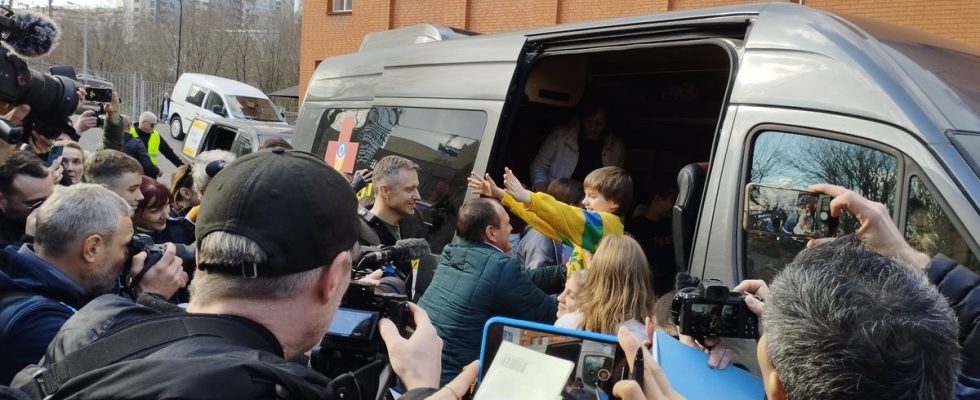From our special correspondent in kyiv,
Denys is stamping his feet in his bottle-green coat, under the bright kyiv sun. The father of the family is feverishly awaiting the return of his three children: Diana, 14; Yana, 11 years old and Nikita, 10 years old. When the black van of the Save Ukraine association appears at the corner of the red brick building, it rushes. The president of the association, Mykola Kuleba, slides the door and Denys cannot hold back. He cocks his head, gazing from child to child in hopes of catching a glimpse of them. When suddenly, a bright yellow sweater and a disarming smile capture his attention. The youngest of the group throws himself into the arms of his father.
The little boy relishes a paternal embrace he hadn’t known for six months. With his sisters, he was stuck in a summer camp in Yevpatoria in Crimea. “When I saw my dad, I said to myself that I was finally going to go home,” Nikita breathes a little later. The siblings separated from his family sound like a symbol, while kyiv accuses Moscow of massively deporting Ukrainian children. According to the Ukrainian authorities, more than 16,000 children have been abducted by Russia since the beginning of the invasion. The Kremlin claims to have “saved” 733,000 Ukrainian children. Last Friday, the International Criminal Court (ICC) issued an arrest warrant against Russian President Vladimir Putin for the war crime of “illegal deportation” of Ukrainian children.
“Dangerous and extremely expensive” odysseys
“This arrest warrant was issued thanks to organizations like us, which documented these crimes and alerted public opinion,” says the president of Save Ukraine. It is this organization which enabled the return of seventeen children from the Kherson and Kharkiv oblasts on Wednesday. According to the association For Ukraine, their freedom and ours, less than 200 children have been recovered. “It is dangerous and extremely expensive to make these trips to recover deported children. Sometimes, mothers find the structure where their child is held, go there but unfortunately do not manage to bring him back,” explains Mykola Kuleba. To pick up children sent to summer camp in Crimea, like Nikita, you have to make a big detour because it is impossible to cross the front. And the trip lasted a good week through Russia and then Belarus.
“It was hard on the border with Belarus,” confesses Diana. “It took a long time, they looked at all our documents, they searched all our things. And afterwards, we had to walk a kilometer to cross the border, I still have aches, ”laughs the eldest of the siblings. Yula traveled to Crimea herself to pick up her 12-year-old son, Maxim. Armed with a power of attorney, the mother of the family also brought back three other children. “They agreed to return my son to me without making a fuss. But I waited an hour for the other three because they asked for confirmation from Moscow,” she explains.
” I feel guilty “
These parents, who were living under Russian occupation at the time, decided to send their children to summer camps, prompted by advertisements that were looping on the radio and by teachers who advised them to do so. “The children’s teacher called us after a strike near their school. She suggested that we send them to a holiday camp, away from the war. I thought it was a good idea,” recalls Denys. But after the Ukrainian counter-offensive, the Russians did not send her children home. Yula tells a similar story.

“I signed a letter for him to go to summer camp for two weeks. At the time, we were always hiding in the basement because of the bombardments, there was no school. Maxim wanted to leave, a lot of children were leaving, ”recalls the mother. The memory is painful. Yula clings to her water bottle, her only son at her side at last. “I didn’t think it was dangerous,” she breathes. ” I feel guilty. I repent,” she breathes, her gaze fixed on her shoes. The children do not report any abuse. “The teachers behaved normally even though they didn’t tell us why we weren’t going home. But I didn’t ask them,” Nikita admits.
From the Russian anthem to absence
The children all had to learn the Russian anthem in this colony where Ukrainians rubbed shoulders with Russians and Poles. Every morning, they did exercises while listening to it and also had to sing it regularly. They complain unanimously of the activities imposed on them from evening to morning. “We had no free time,” berates Diana. Singing, drawing, football, basketball, volleyball… The children were constantly busy with activities. On the other hand, they had only limited contact with their parents. Denys and his wife, who remained in the Kherson oblast with their fourth child, aged 5 and a half, communicated occasionally with the eldest of the siblings by telephone.
But Yula explains that the exchanges with her son were chaotic. The teenager had his phone stolen and his mother had to go through the team leader of the colony to hear from him. “But they were changing all the time. When I had the right contact, I could talk to him once a week. But when it wasn’t, it was difficult. Sometimes we could only chat once a month,” the mother regrets. A distance that left its mark. “In Crimea, I didn’t recognize him right away… He’s grown so much in six months,” breathes Yula, casting a sad look at her son. Absence loosens the ties, a nightmare for all Ukrainian parents separated by war from their child. And even more so for those who have been fraudulently adopted in Russia and whom they fear never to find again.

